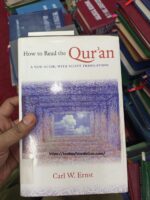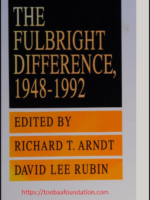Playing Through: A Guide to the Unwritten Rules of Golf By Peter Post
Playing Through: A Guide to the Unwritten Rules of Golf
| BOOK NAME | Playing Through: A Guide to the Unwritten Rules of Golf |
|---|---|
| BOOK AUTHOR |
Related products
-
HADITH SCIENCES BY STOYANKA KENDEROVA
HADITH SCIENCES BY STOYANKA KENDEROVA
HADITH SCIENCES BY STOYANKA KENDEROVA
This book is presented for introduction if you want to buy this book or get its pdf then you can contact us through whatsapp number or comments in review, also through facebook page. -
Islamic Renaissance in South Asia, 1707 – 1867: The Role of Shah Wali Allah and his Successors
Islamic Renaissance in South Asia, 1707 – 1867: The Role of Shah Wali Allah and his Successors
This book is presented for introduction if you want to buy this book or get its pdf then you can contact us through whatsapp number or comments in review, also through facebook page. -
MUWATTA IMAM MALIK (English)
The Muwatta of Imam Malik, compiled during the early Abbasid period, is regarded by some scholars, including Shah Waliyullah, as the most authentic book on Ḥadith. The juristic verdicts in Muwatta’
reflect the practice of the Medinese and the consensus of the Medinese scholars.
After the demise of the Holy Prophet (may peace be upon him), many of his Companions settled in the conquered provinces. Some of their successors collected and codified Hadith. For example, Ibn Jariḥ
in Mecca, Awza’i in Syria, Hammad in Başrah, Haitham in Wasit, Ma’mar in the Yemen, Ibn Mubarak in Khurasan and Jarir b. Hamid in Rayy collected Hadith. But none of these collections could compare
with the Muwatta’ of Imam Malik, who passed his whole life in Medina and, therefore, had direct access to the most reliable authorities on Hadith, because most of the leading Companions of the Holy Prophet
(may peace be upon him) and their successors lived and died in Medina and narrated traditions from the Holy Prophet (may peace be upon him). The Muwatta’ of Imam Malik is based on the traditions narrated by them and the juristic verdicts given by them.
The word “Muwatta” literally means the trodden or beaten path. In his book, Musawwa, Shah Waliyullah says that “trodden path” or “beaten path” means the path followed by eminent religious
authorities. In other words, it means those verdicts which have been discussed by all religious scholars and about which there is complete agreement. According to Maulānā Sulaiman Nadvi, “Muwatta” means that trodden or beaten path which has been trodden upon by all the Companions of the Holy Prophet (may peace be upon him), or, in other words, it means the agreed practice of the Companions of the Holy Prophet (may peace be upon him).
Before Imam Malik finalised his book, the Muwaṭṭa’ contained about ten thousand traditions of the Holy Prophet (may peace be upon him), but since Imam Malik exercised great care in selecting Hadith (traditions), he omitted eight thousand traditions. In its final form, the Muwaṭṭa’ contains only about two thousand aḥadīth (traditions). Since the Muwatta’ deals only with such aḥādith as have a bearing on juristic verdicts, it omits many chapters and headings found in the Sahihs of Imam Bukhārī, Imam Muslim, Tirmidhi, and others.
Muwatta’ has been narrated from Imām Mālik in thirty different ways. Of these, sixteen are famous. Four narrations, those by Yaḥyā, Ibn Bukair, Abū Mus’ab and Ibn Wahb, are most authoritative, but Yahya’s narration surpasses them all in popularity and fame. Imam Malik’s jurisprudence (fiqh) produced lasting effects on the entire Muslim world. His disciples spread in all the provinces of the Muslim Empire. It is true that Imam Abu Hanifah’s disciples were scattered in the Hijäz, Persia and Transoxania, but they did not reach Africa and Spain. Imām Awzā’i’s fiqh (jurisprudence) won popularity in Spain, but it did not benefit the people of Iraq and Persia. On the other hand, Imam Malik’s disciples carried his juristic learning to all corners of the Muslim world.
The Muwaṭṭā’ of Imam Malik was compiled during the reign of Mansur, the second Abbasid Caliph. After he was installed as Caliph in 136 AH., Mansur made his first Pilgrimage to Mecca. He visited Medina where he was received by leading scholars and men of eminence. Sufyan Thawrī, Sulaiman Khwaṣṣ and Imam Malik also came to greet him. When Mansur saw Imam Malik, he addressed him saying: “I have become disgusted with the differences of the jurists on Islamic law in different regions of the Empire. There is nothing of juristic learning in Iraq. The Syrians are known for their ardent love for jihad There is little learning among them. All juristic knowledge and scholarship is centred in Hijaz and you are the leader of the scholars of Hijaz. I wish that your book, Muwaṭṭa’, may be kept in a prominent place in the Ka’bah, so that all the people should refer to it on juristic questions. I also wish that copies of the Muwaṭṭā’ may be circulated in all parts of the Empire so that all juristic verdicts may conform to it.” But Imam Malik expressed his disagreement with the opinion of Manşür. He said: “The Companions of the Holy Prophet (may peace be upon him) settled in all provinces of the Empire. Their juristic opinions and verdicts command respect and reverence of jurists in different regions of the Empire and the people of these regions follow their juristic opinions. Under these conditions, the people should not be forced to follow the opinions of a single jurist who is not infallible, after all, and may commit errors.”
Another incident of the same kind shows the sturdy independence of mind of Imam Malik and his refusal to submit to the wishes of the governmental authority. Although Manṣur was very kind to the Imām, the latter never recognised the legitimacy of his government. Once he issued a fatwa that the caliphate belongs rightfully to Nafs Zakiyyā, a descendant of the Holy Prophet (may peace be upon him). The people objected saying that they had sworn fealty to Manṣur. Imām Malik said: “Manṣur has coerced you into doing this and the Shari’ah does not regard as valid any act done under coercion. There is a hadith (tradition of the Holy Prophet) that if a man is forced to divorce his wife, the divorce would be invalid.” On hearing this, Ja’far, the Governor of Medina, asked the people to renew their oath of fealty to Mansur and ordered Imam Malik not to issue any fatwa declaring that a divorce obtained by force or under coercion is invalid as this would strengthen the case of those who regarded as invalid the
oath of fealty obtained by Manṣur under coercion. But Imam Malik refused to be browbeaten and continued to give his verdict against divorce under coercion. For this act of disobedience to the governmental authority, Imam Malik was flogged in public until he bled white, but still he refused to bow to the wishes of the rulers.
22 December 1979
(Prof) Mazheruddin Siddiiq
The Muwatta of Imam Malik holds significant importance in the Hadith tradition of Islamic studies for several reasons:
- Authenticity and Reliability: The Muwatta is considered one of the most authentic collections of Hadith in Imam Malik was known for his rigorous standards in selecting Hadith, and he only included those narrations that he believed met the criteria of authenticity. This makes Muwatta a trusted source of Hadith for scholars and students of Islamic studies.
- Early Compilation: Muwatta is one of the earliest Hadith compilations in Islamic history. Imam Malik compiled it during the 8th century, making it one of the foundational works in the development of Islamic jurisprudence (fiqh) and Hadith scholarship.
- Geographical Significance: Imam Malik was based in Medina, which is considered one of the holiest cities in Islam. His collection reflects the practices and traditions of the people of Medina during his time. This makes Muwatta particularly valuable for understanding the early Islamic community and its practices.
- Integration with Fiqh: Muwatta is unique among Hadith collections because it integrates Hadith with jurisprudential (fiqh) rulings. Imam Malik sought to provide practical guidance to jurists, judges, and the Muslim community as a whole by combining Hadith with legal rulings. This approach has had a lasting impact on the development of Islamic jurisprudence.
- Recognition by Islamic Scholars: Muwatta has been widely recognized and respected by scholars of different Islamic schools of thought. It is not limited to the followers of the Maliki school; scholars from other schools have also acknowledged its significance.
- Cultural and Historical Insight: Beyond its religious and legal importance, Muwatta provides valuable insights into the culture and society of early Islam. It contains Hadith related to various aspects of life, including social customs, ethics, and the behavior of the Prophet Muhammad, offering a holistic view of the time.
- Comparative Study: Scholars and researchers often use Muwatta as a basis for comparative studies of Hadith across different collections. Its unique compilation style and content make it a valuable resource for understanding how Hadith were transmitted and evaluated in the early Islamic period.
In summary, the Muwatta of Imam Malik is highly significant in the Hadith tradition of Islamic studies due to its authenticity, early compilation, geographical context, integration with fiqh, recognition by scholars, and its role in providing insights into early Islamic society and culture. It continues to be a vital source for scholars and students of Islam seeking to understand the Prophet’s traditions and the foundations of Islamic jurisprudence.
The English translation of the Muwatta of Imam Malik:
- Islamic Scholarship: Highlighting the translation’s role in advancing Islamic scholarship and knowledge.
- Hadith Tradition: Emphasizing the translation’s connection to the broader tradition of Hadith in Islam.
- Cross-Cultural Understanding: Signifying how the English translation promotes cross-cultural understanding by making Islamic texts accessible to English-speaking audiences.
- Religious Texts: Identifying the translation as a key religious text for Muslims and scholars of Islam.
- Historical Significance: Stressing the historical importance of translating this early Islamic work into English.
- Jurisprudence and Fiqh: Reflecting the translation’s relevance to the study of Islamic jurisprudence (fiqh).
- Medina’s Legacy: Highlighting the role of Medina’s historical legacy in shaping the Muwatta and its translation.
- Comparative Religion: Indicating how the translation aids in comparative religion studies, allowing scholars to compare Islamic traditions with other religious texts.
- Cultural Heritage: Recognizing the translation as part of the cultural and religious heritage of Islam.
- Interfaith Dialogue: Suggesting its role in promoting interfaith dialogue and understanding.
-
-
THE FULBRIGEHT DIFFERENCE, 1948-1992 EDITED BY RICHARD T. ARANDT DAVID LEE RUBINE
THE FULBRIGEHT DIFFERENCE, 1948-1992
EDITED BY RICHARD T. ARANDT DAVID LEE RUBINE
Tranaction Publishers New Brunswick(U.S.A) and London(U.K)
Pages 448You visit this website and buy books in PDF and Kindle at a very low price compared to Amazon and other bookshops. Let it be clear that this website is free for books. You buy books from this website and support our mission. Financial support. The purpose of this website is to unite libraries around the world and create a digital catalog of the books in them and make the rare manuscripts scanned and made available in PDF and Kindle format for the service of scholars.
Go ahead and support us in this mission.OTher Libarary Links
Knoozedil Blog
-
CONCISE ENCYCLOPAEDIA OF ISLAM BY PROFESSOR HUSTON SMITH
CONCISE ENCYCLOPAEDIA OF ISLAM BY PROFESSOR HUSTON SMITH
This book is presented for introduction if you want to buy this book or get its pdf then you can contact us through whatsapp number or comments in review, also through facebook page. -
The captives of Tirah
The captives of Tirah
This book is available in Municipal Library Rawalpindi, Tubi Book Foundation wants all the books of this library to be presented in PDF format. In this series this book is currently being presented as an introduction if you want the full pdf of the book you need then you can go to the review below and send your request, if the book is in high demand. We provide PDF of this book. Thanks









Be the first to review “Playing Through: A Guide to the Unwritten Rules of Golf”